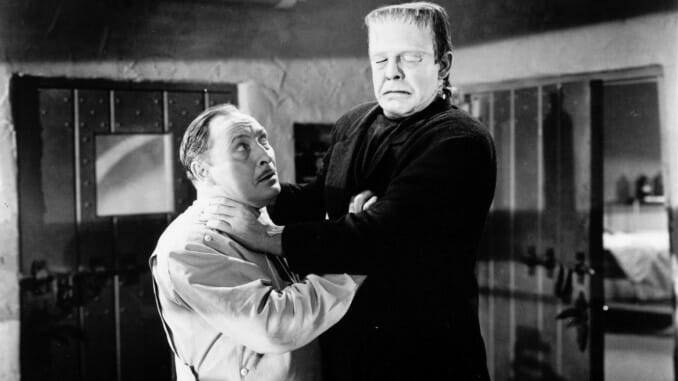Introducing Endless Mode: A New Games & Anime Site from Paste
Paste’s ABCs of Horror 2 is a 26-day project that highlights some of our favorite horror films from each letter of the alphabet. The only criteria: The films chosen can’t have been used in our previous Century of Terror, a 100-day project to choose the best horror film of every year from 1920-2019, nor previous ABCs of Horror entries. With many heavy hitters out of the way, which movies will we choose?
You’ll often see it cited as common knowledge among film buffs that Universal’s 1935 sequel Bride of Frankenstein is “even better than the original”—an idle observation repeated so many times that it’s been canonized over the decades, some 90 years after Boris Karloff first donned the iconic monster makeup. True horror geeks, on the other hand, are likely to extend that same sort of praise and recognition to the second sequel of the series, 1939’s Son of Frankenstein. I am among these monster aficionados—Son of Frankenstein was the “S” of last year’s ABCs of Horror for a reason, because it is in many ways the peak of the entire Frankenstein series in terms of the grandiosity of its production, which is unmatched in the Universal monster canon. Its opulent setpieces and dramatic performances reach operatic heights that clearly illustrate just how much the American film industry had matured from the beginning to the end of the 1930s.
Where cultural reevaluation has steadily molded the reputation of Son of Frankenstein into a classic alongside the first two entries in the series, however, 1942’s The Ghost of Frankenstein has not been so lucky, standing out as the beginning of a pretty clear descent into what would become genuine mediocrity. Fans of the series will still find ample macabre pleasures in a film that is rarely invoked by even the most dedicated of horror buffs today, but Ghost proves to be emblematic of Universal’s changing outlook on the horror genre in the 1940s—lower budgets, limited vision, and a potboiler attitude. In truth, The Ghost of Frankenstein functions more like a fun “last hurrah” for the original era of the Universal Monsters, a final quality outing before they began to fall increasingly into ignominious self parody. It has “end of an era” written all over it.
Perhaps most notable to the purists is the fact that Boris Karloff doesn’t return as the Monster this time around, having been replaced by a sour-faced Lon Chaney Jr., fresh off his iconic role in 1941’s The Wolf Man. Universal was clearly trying to cement Chaney Jr. as their primary horror/monster figure at this point, but he never manages to generate the pathos or level of performance that was customary for Karloff. He’s the most obvious thing holding Ghost of Frankenstein back, because his performance reads as particularly lethargic—he barely seems to attempt to emote, playing the monster as a blank slate rather than the empathic, curious, and finally bitter creature portrayed by Karloff. It also doesn’t help that he seems to always have his eyes closed, for reasons I’ll never fully understand.
Still, the actual plot and meat of The Ghost of Frankenstein is classic pulp that is hard to dislike, and you get another quality supporting turn out of the great Bela Lugosi, who is again playing the seemingly immortal and decidedly creepy lab assistant Ygor, who was first introduced in Son of Frankenstein. After surviving the castle destruction at the end of the previous film, Ygor and the obedient monster make their way to contact the last surviving son of the original Henry Frankenstein, here named Dr. Ludwig Frankenstein, played by Cedric Hardwicke. It’s a role that struggles to compare to the effortlessly classy performance of Basil Rathbone as Wolf Frankenstein in Son, but Lugosi’s Ygor manages to carry the day as the scheming trickster, who wants to insert his own brain into the Monster’s head in order to harness his great strength for himself.
That is a pretty damn zany plot outline, but it fits with a film that displays Universal’s classic disregard for things like continuity—you have Lionel Atwill here playing Dr. Ludwig’s assistant, one movie after he was one of the primary antagonists in Son of Frankenstein, and he’s not the only actor playing double duty in this series. Suffice to say, Ghost of Frankenstein wasn’t taking itself particularly seriously, and this, coupled with a lightning pace (67 minutes!) and plenty of action makes it a very breezy watch all these years later.
Following Ghost, the Frankenstein series would begin to steadily dwindle, with the titanic clash promised in Frankenstein Meets the Wolf Man arriving in somewhat underwhelming fashion before cobbled-together stuff like House of Frankenstein and House of Dracula dispensed with even the pretense that the Universal Monsters could still be considered “scary.” In a post-war America, it would be a decade or so before horror was taken seriously once again, but here in 1942 Ghost of Frankenstein was at least giving it an earnest shot. It’s not the crown jewel of Universal’s original Frankenstein series, but thanks to Bela Lugosi in particular, it retains an undeniable charm.
Jim Vorel is a Paste staff writer and resident horror guru. You can follow him on Twitter for more film and TV writing.
